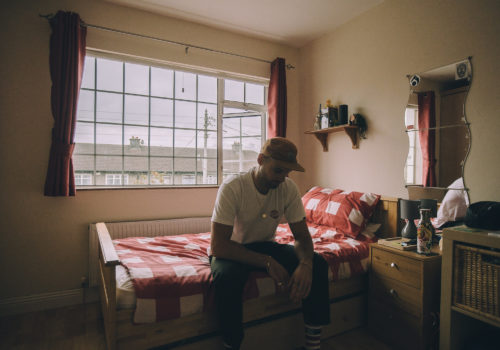Spiking in Ireland is on the rise and it needs to be tackled. Now.
Words: Eva O’Beirne
Artwork: Paul Smith
Kate Dempsey, a twenty-year-old from Newbridge, Kildare went to a nightclub on Saturday 12 March. She was one of five women spiked that night, all in the same venue.
After posting her story on social media to raise awareness, District sat down with Kate to discuss her perspectives on what happened that night, the reaction she’s seen on Facebook and Instagram and what venues and policy-makers can do to support victims of spiking.
Kate who works full-time in hospitality describes her life as “work, work and work”. She doesn’t go out that often and to go out to a nightclub for her is a rarity. “A couple of months ago, when things opened up again I would have made the effort to go out a lot but now not so much. It was a relief to be out with the girls, to have that distraction,” says Kate.
She quickly notes how that release has been taken away, and that she still hasn’t processed the mental impact the incident had on her. She explains how little she remembers after 23:00 that night. “I had three drinks,” Kate describes. “From what my friends have told me, I seemed fine up until two in the morning. But from two onwards my friends started getting texts from me that were gibberish.”
“About ten past two, one of the other girls in there saw me at the edge of the dancefloor with a drink in my hand and my eyes were rolling into the back of my head.”
Kate describes how the security guard seemingly just took the drink out of her hand and barred her from drinking anything else but didn’t check in on her. After that, her friends decided to take her home.
“At twenty-five past three, that’s when the seizures started,” says Kate.
Kate notes how even in the ambulance, the paramedics knew instantly that her symptoms weren’t caused by alcohol alone. “They definitely see cases like this more often than we think,” she comments. “I couldn’t have asked for a better experience with the staff.”
“I had no control over my body, I knew what was happening to me but I couldn’t do anything, I couldn’t speak or anything until the ambulance came.”
Kate Dempsey
Once she arrived in the hospital and met with a doctor, they asked if she had been in the nightclub she was at with friends. Kate was one of five women brought into Naas hospital who were all spiked in the same venue.
“I didn’t get into hospital until around six, so I was quite late in comparison to everyone else. They took my bloods and I was waiting until around nine that morning to hear about what was in my system.”
When asked how it felt to know four other people had been spiked with her, Kate notes her confusion and emotional turmoil around the incident: “I think everyone knows that [spiking] is a thing, but you never think it could happen to you.”
“We don’t know if there was anyone else who was spiked but may not have had as bad a reaction as us. And that’s terrifying.”
National policies to tackle spiking and club safety have been frequent but scattered. They’ve certainly increased in recent months due to reports of spiking by needles, but the responsibility to avoid being spiked rests on individuals.
In December 2021, the Union of Students Ireland launched a spiking awareness campaign due to concerns that the rate of spiking had increased since restrictions were eased. For the campaign, the USI pledged to work with the nightlife industry and SUs on plans to make venues safer for students and others, looking at actions such as further training for staff, monitors looking out for spiking and bag and person searches.
USI Vice President for Welfare, Somhairle Brennan described the necessary steps needed to tackle spiking on a national level: “It is the responsibility of venues and clubs to work to keep their patrons safe and to build spaces that protect their partygoers.”
“However, that should happen in conjunction with organisations such as USI, SUs and other welfare organisations to inform people about these issues as much as possible. And it is the job of Government and the Gardaí to treat these crimes seriously.”
The Department of Justice collaborated with the USI on this campaign, emphasising the potential fines and prison sentences that could be given to those who spike others, but it is unclear if anti-spiking policies will be implemented in other areas of Irish life, such as mandatory training for bar staff or in SPHE programs.
Safe Gigs Ireland has started a survey in order to gauge the degree of spiking in Ireland. Similar to the “Spike Report”, an anonymous UK-based database that records spiking, this survey will instead focus on how Irish venues can improve on their responses to victims.
According to the HSE, the key signs that someone has been spiked include drowsiness or light-headedness, difficulty speaking and concentrating, slurring words, loss of balance, finding it hard to move, memory loss, blurred vision and paranoia, unconsciousness and vomiting.
To take part in the Safe Gigs Ireland survey click here.
Surveys such as the one run by Safe Gigs Ireland will no doubt expose the horrific attitudes of victim-blaming that are normalised within Ireland. When asked what the reaction has been like online to her story, Kate noted that although the response has been extremely positive for the most part, the negative comments have had an effect on her well-being.
“There has been a few people commenting asking certain questions about what I was wearing, was it dodgy vodka or how much I had to drink. I had another interview recently where I was asked if I had left my drink down or done something wrong which felt weird,” says Kate.
“I don’t think people realise how they make you feel by asking questions when you’re trying to raise awareness. It’s like they’re looking to blame you for what happened.”
Kate Dempsey
Gardaí recently stated in January that there was no evidence that confirmed reports of spiking by needle, despite 39 individuals coming forward and photographic evidence of the prick marks by needles in the victims’ skin. It seems that time and time again, the responsibility of safety in nightlife settings falls to individuals to protect themselves, which feeds into the cycle of victim-blaming.
When asked what motivated her to tell her story online, Kate outlines her wish for the topic to be de-stigmatised. “It’s very easy to hear about a story and think “oh that could never happen to me” and by the time you’re on your next night out you’ve forgotten about it.”
“I definitely had never heard of five people being spiked in the same venue, so I thought by posting about it I could at least raise more awareness as it might hit home for more people that spiking is on the rise.”
Kate notes how other victims have brought the issue forward to the venue she was also spiked at, and how they were dismissed and accused of being too drunk.
“So many people contacted me,” Kate describes. “Telling their stories. Much more than any amount of posts I’ve seen about spiking. So maybe if we all posted about it, we could give more attention to it and realise we need to solve it somehow.”
The threat of sexual violence and abuse as a result of spiking is something that is rarely addressed. Those who comment asking about how much victims had to drink or what they were wearing rarely consider what could have happened to a victim of spiking if they were alone or went missing on a night out.
In February, University College Cork and their students’ union released a general warning before RAG week to caution students about spiking. The union is looking into supplying drinks covers to students in order to combat the issue. Representatives from UCCSU has noted that during one week there were five reports of spiking alone.
Kate herself has spent the past few days thinking about how spiking should be prevented in venues: “Whether its training or simply knowing the signs of when someone has been spiked, I wish all bar staff would keep an eye out in clubs and venues. I definitely feel there’s too much emphasis on what victims could have done wrong than rather what a venue could have done to prevent them being spiked.”
“I have this huge paranoia because they never found out what was in my system, so I don’t know about any possible long-term effects. I had a headache a few days after that Saturday and it sent me into a spiral. It’s been a week and a half now and I haven’t stopped thinking about it.”
“I have this huge paranoia because they never found out what was in my system, so I don’t know about any possible long-term effects. I had a headache a few days after that Saturday and it sent me into a spiral. It’s been a week and a half now and I haven’t stopped thinking about it.”
“The reactions that people have towards people who speak out about being spiked definitely prevent victims from coming forward. 100 per cent. They’re terrified.”
Kate Dempsey
According to recent figures from An Garda Síochána, 73 incidents of spiking by needle or drink were reported between October 1, 2021, and February 14, 2022. Of those incidents, 19 were reported between January 1 and February 14 alone.
So when will the rates become too high for policy to intervene? Do we just have to accept that being spiked on a night out is a typical experience?
The mental and physical aftermath of these incidences is devastating for victims and their families and friends, yet we have no centralised system for those seeking help let alone effective reporting measures that hold both perpetrators and venues to account.
The objectives of those who wish to spike people are impossible to ignore, yet they’re hardly ever caught. And if they are, rates of prosecution and conviction are abysmally low. How can the Government sit back and let the trauma of all victims build up?
When asked what she would want people to know about what it is like to be spiked, Kate lists three things: “First I want people to realise that it doesn’t just happen to you one night and then you forget. You can’t stop thinking about it and what could have happened to you. Secondly, don’t forget that it happened to someone. Keep checking in and don’t leave someone alone.”
“And thirdly, recognise that they will be paranoid, that they will be anxious and scared. It’s why I want to raise awareness around this topic so that people don’t feel alone when they’re scared.”
Elsewhere on District: Saving Tolka Park: The past, present and possible future of a Dublin institution







